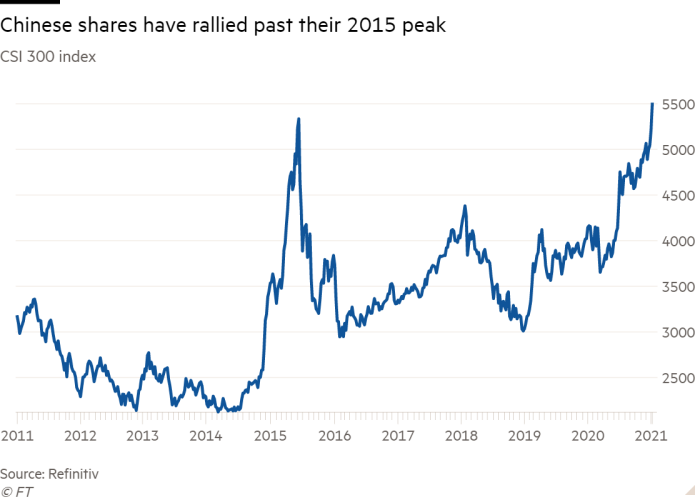
China will emerge as a rival to New York and London as the world’s financial centre, according to Bridgewater founder Ray Dalio, who is betting heavily on what would be an epochal shift in the global economy.
2020 was a “defining year” for Chinese financial markets, the co-chief investment officer of the world’s biggest hedge fund told the Financial Times last month, with the coronavirus crisis starkly highlighting the country’s economic outperformance — and spurring Rmb1tn of investment inflows.
Although China’s financial system remains less developed than its western peers, it will be only a matter of time before it is a contender for Wall Street and the City of London’s supremacy, Mr Dalio said.
“China already has the world’s second largest capital markets, and I think they will eventually vie for having the world’s financial centre,” Mr Dalio said. “Throughout history, the largest trading countries evolved into having the global financial centre and the global reserve currency.
“When you see the transition from one empire to another, from the Dutch to the British to the American, to me it just looks like that all over again,” he added in an interview with the FT in mid-December, shortly before the death of his son.
Foreign investment has been lured into China by a combination of its recovery from the pandemic — which means its economy will have grown about 1.9 per cent last year, according to the IMF, even as developed peers suffered their biggest recessions in generations — and moves to include its stocks and bonds in several influential financial indices.

Tens of billions of dollars worth of inflows from international investors helped lift the CSI 300 mainland stock index by 27 per cent in local currency terms during 2020. Chinese government bonds, meanwhile, still offer yields far greater than developed countries’ debt.
Many analysts and money managers expect international investors to continue ratcheting up their allocations to China in the coming years. “I have been immersed in China since 1984 and bullish on China for a long time . . . and all the time I got scepticism — up until now,” Mr Dalio said.
Investing in China clearly brings challenges and political risks, highlighted by the suspension of Ant Group’s planned flotation last year, when Beijing put on ice what was set to be the world’s biggest IPO.
“Nothing’s perfect, but you’ve got to diversify,” Mr Dalio said. “The capital markets are not only growing, they’re good investments, and the world is underinvested there.”
Mr Dalio predicts China could in time account for a “very meaningful” part of Bridgewater’s business, which has about $150bn in assets under management. The onshore, renminbi-denominated version of its All Weather China Fund has about $300m under management, and returned 24.6 per cent last year.
All Weather is a range of “risk parity” funds, a passive strategy designed to generate steady returns by investing in a variety of markets, weighted according to their volatility.
The China offshore version has about $4bn in assets and returned 11.9 per cent in 2020, while the flagship Pure Alpha fund — a more traditional “macro” hedge fund that seeks to profit from economic trends — lost 7.6 per cent, according to people familiar with the matter.
Mr Dalio expects to introduce something more similar to Bridgewater’s Pure Alpha Fund in China in the coming years. “As we learn more, develop our expertise and build our edges, we will build that out more completely,” he said.
The figure for Bridgewater’s assets under management has been updated to reflect the 2020 year end value.
@robinwigg
